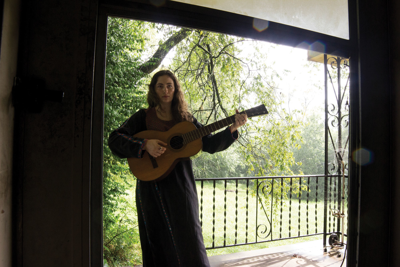
Looking at the career of Nashville singer-songwriter Ziona Riley, an adept of pop music might be moved to muse about the relationship between art and commercialism. Riley, who so far has released recordings that feature just her expressive voice and expert post-folk guitar, writes songs that are grounded in her own experiences. Because she seems alive to the nuances of perception, she is an exemplary singer-songwriter. She’s a self-contained artist who draws from the work of eccentric late-’60s and ’70s singer-songwriters. But there’s nothing about her style of eccentricity that would forestall a career as a writer and performer whose work could reach a large audience.
Riley, who is 30, plays twice this week: On Saturday, she supports a bill organized by arts nonprofit FMRL at Proper Saké, and on Monday, she’ll play at Springwater, a venue that has hosted its share of oddballs and folkies. I’ve seen her perform a handful of times, and she has affinities with other young Nashville musicians whose work sits on the fence that separates pop ambitions from the pursuit of pure art. As Riley discovered when she moved to Nashville from the Bloomington, Ind., area in 2011, it’s a narrow fence that hides spikes that will poke you if you sit down on the wrong spot.
“As soon as I got [to Nashville], I started playing open-mic shows, because that’s how I got started in Bloomington,” Riley tells the Scene. “The Bloomington open mics were just interesting, and I met really cool people. Here I went to some open-mics and writers’ nights where it was people trying to get discovered and trying to make commercial music. I was just like, ‘Well, there’s not a place for me here.’ ”
Riley grew up partly in Gosport, Ind., a small town about 20 miles northwest of Bloomington. One of six siblings, she absorbed classical and contemporary Christian music in a household that forbade listening to pop and rock. Her mother is a classically trained flautist, while her maternal grandparents had careers as musicians.
Riley, who briefly took piano lessons when she was a child, also learned harmony singing at a young age. Despite the restrictions her parents imposed upon the family, Riley got a thorough grounding in musical fundamentals — lessons that have informed her highly disciplined performance style.
“I would say it was diverse and limited at the same time,” says Riley about her upbringing. “For the first seven or eight years of my life, my parents were extremely strict religiously.” She got a taste of popular music after her family won a radio contest that required listeners to identify pieces of classical music. The prize was a Simon & Garfunkel CD, and when the family moved closer to Bloomington a few years later, she began to listen to rock bands like the Pixies and Led Zeppelin.
Although Riley was temporarily discouraged by what she perceived as Nashville’s obsession with commerciality, she never quit playing music. She began playing bass with Nashville rock band Heinous Orca when she hit town, and eventually found a group of like-minded musicians whose example inspired her to start writing songs again.
Recorded quickly, Riley’s self-titled four-song EP from 2011 is a somewhat tentative effort that points the way toward her 2019 release Not Too Precious. On the new record, songs like “Kerfuffle” and “Coming of Age in the Midwest” seem autobiographical, but Riley takes such obvious pleasure in wordplay that they never come across as solipsistic.
“Kerfuffle” recalls the work of ’70s songwriter Dory Previn, whose material on albums like 1971’s Mythical Kings and Iguanas explored sexual politics and the lure of stardom. “Meanwhile, the signs of the end times appear / And American birdsongs get muffled / Felinity winning each scuffle,” Riley sings in “Kerfuffle.” In a more serious vein, the five-minute “Bury This Heirloom” is a superb song about escaping the pull of family.
Talking to Riley, I get the sense that she’s listened hard to Previn and Joni Mitchell. Still, Riley’s songs don’t betray any anxiety of influence. Like fellow Nashville quasi-pop artists Lou Turner, who works in a similar singer-songwriter mode both solo and with Styrofoam Winos, and Crave On leader Patrick Orr, who writes in a Lou Reed-meets-Grant McLennan style, Riley has the stuff to be, well, popular. If the New New Nashville has taught us anything, it’s that commerciality and artistic ambitions don’t have to be polar opposites.
“I think I’m thinking about my approach now — now that I’m getting some attention,” says Riley. “Now that I know anyone cares, I’m sort of like, ‘Huh, how do I write songs? What do I do to write songs?’ ”





